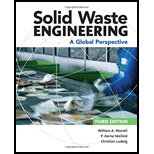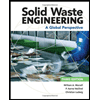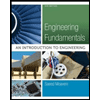
Concept explainers
The composition of waste when some percentage of waste was recycled and to determine the change in energy content.
Answer to Problem 2.18P
The following table shows the composition of waste when some percentage of waste was recycled.
| Component | Energy(Btu/lb) | Initial weight(lb) | Final weight(lb) |
| Food | 2000 | 10 | 9 |
| Paper | 7200 | 33 | 16.5 |
| Cardboard | 7000 | 8 | 8 |
| Plastics | 14000 | 5 | 3.75 |
| Textile | 7500 | 3 | 3 |
| Rubber | 10000 | 4 | 4 |
| Yard Waste | 2800 | 18 | 18 |
| Metal | 300 | 10 | 7 |
| Miscellaneous | 3000 | 9 | 9 |
Thus, the change in energy content is
Explanation of Solution
Calculation:
The following table shows the change in the composition of waste.
| Component | Energy |
Initial weight |
Change in weight |
Final weight |
| Food | 2000 | 10 | |
9 |
| Paper | 7200 | 33 | |
16.5 |
| Cardboard | 7000 | 8 | - | 8 |
| Plastics | 14000 | 5 | |
3.75 |
| Textile | 7500 | 3 | - | 3 |
| Rubber | 10000 | 4 | - | 4 |
| Yard Waste | 2800 | 18 | - | 18 |
| Metals | 300 | 10 | |
7 |
| Miscellaneous | 3000 | 9 | - | 9 |
Calculate the change in energy content.
Here, change in energy content is
Substitute the values from the table.
Conclusion:
The following table shows the composition of waste when some percentage of waste was recycled.
| Component | Energy(Btu/lb) | Initial weight(lb) | Final weight(lb) |
| Food | 2000 | 10 | 9 |
| Paper | 7200 | 33 | 16.5 |
| Cardboard | 7000 | 8 | 8 |
| Plastics | 14000 | 5 | 3.75 |
| Textile | 7500 | 3 | 3 |
| Rubber | 10000 | 4 | 4 |
| Yard Waste | 2800 | 18 | 18 |
| Metal | 300 | 10 | 7 |
| Miscellaneous | 3000 | 9 | 9 |
Thus, the change in energy content is
Want to see more full solutions like this?
- Solid Waste Management On daily basis, and for six months a family brought to the home 60.0 lb of consumer good (food, newspaper, magazines, etc. The family consumes 10.0 lb of food that day, and 6.0 lb of food is stored. Paper is 35% of the waste produced and all of it goes to the fireplace except magazines. The magazines received represent 15 percent of the paper wastes of the day, and they are not thrown away. If bottles and cans represent 60% (by weight), and are recycled by the family. Twenty- eight percent of the paper waste (35 percent total) is burned in the fireplace. Calculate the following: A- The amount of solid wastes disposed from the home during one-day period. B- The amounts of bottles and cans that can be recycled over the six months' periodarrow_forwardThe majority of municipal solid waste is 64% paper. What ways would you suggest to reduce paper waste?arrow_forwardWhat types of materials are available for recycling or reusing locally or near in our places? Explain in 3 paragraphs.arrow_forward
- How much hydrochloric acid (kg/d) is required to neutralize a waste with 20 mg/L NAOH and a flowrate of 220 L/min?arrow_forwardWhich type of recyclable material had the greatest increase in tonnage recycled during the period from 1960 to 2018 and why?arrow_forwardCan I get a thorough step by step for the following question? The US EPA requires hazardous waste incinerators to meet a standard of 99.99% destruction and removal of organic hazardous constituents injected into the incinerator, which is referred to as "four nines DRE". The efficiency is calculated by measuring the mass flow rate of organic constituents entering the incinerator and the mass flow rate of constituents exiting the incinerator stack, as shown in Figure 1. Draw a mass-balance diagram and determine the allowable quantity of contaminant in the exit stream if the incinerator is burning 1.2000 g/s of hazardous constituents. If the incinerator is 96% efficient in destroying the hazardous constituents, what scrubber efficiency is necessary to meet the EPA standard?arrow_forward
- Plastic bags at food stores have become ubiquitous. Often recycling advocates point to the plastic bags as the prototype of wastage and pollution, as stuff that clogs up our landfills. In retaliation, plastic bag manufacturers have begun a public relations campaign to promote their product. On one of the flyers (printed on paper) they say: The (plastic) bag does not emit toxic fumes when properly incinerated. When burned in waste-to-energy plants, the resulting by-products from combustion are carbon dioxide and water vapor, the very same by-products that you and I produce when we breathe. The bag is inert in landfills where it does not contribute to leaching bacterial or explosive gas problems. The bag photo degrades in sunlight to the point that normal environmental factors of wind and rain will cause to break into very small pieces, thereby addressing the unsightly litter problem. Find : Critique this statement. Is all of it true? If not, what part is not? Is anything misleading?Do…arrow_forward18- The typical municipal solid waste with the average composition is (mass of food waste = 15 lb and Energy = 2000 Btu/lb, mass of Paper = 44 lb and Energy = 7200 Btu/lb, mass of Textile = 2 Ib and Energy = 7500 Btu/lb, mass of Rubber = 0.5 lb and Energy = 10000 Btu/lb, mass of Garden trimming = 2 Ib and Energy = 2800 Btu/lb, mass of Wood = 2 lb, and Energy =8000 Btu/lb, mass of Glass= 8 lb and Energy = 60 Btu/lb, mass of Tin cans = 9 lb, and Energy =300 Btu/lb, Dirt, mass of ashes, bricks, etc.= 4 lb, and Energy ashes, bricks, etc.= 3000 Btu/lb), The energy content of typical municipal solid waste isarrow_forwardhow electronic waste and hazardous waste are similar to recyclingarrow_forward
- 47. What is called for the process of burning municipal solid waste in a properly designed furnace under suitable temperature and operating conditions? Select one: a. Incineration b. Landfill c. Vermicomposting d. Recyclingarrow_forwardtopic related: Materials Selection, Re-use, and Recycle. Answer the following question. 2. How important is the re-use and recycling of materials in the industrial and manufacturing plants setting?arrow_forwardIn your community, is waste collection carried out by the municipality or by a private hauler? Who collects the commercial wastes? Define the term; Reusearrow_forward
 Solid Waste EngineeringCivil EngineeringISBN:9781305635203Author:Worrell, William A.Publisher:Cengage Learning,
Solid Waste EngineeringCivil EngineeringISBN:9781305635203Author:Worrell, William A.Publisher:Cengage Learning, Engineering Fundamentals: An Introduction to Engi...Civil EngineeringISBN:9781305084766Author:Saeed MoaveniPublisher:Cengage Learning
Engineering Fundamentals: An Introduction to Engi...Civil EngineeringISBN:9781305084766Author:Saeed MoaveniPublisher:Cengage Learning

